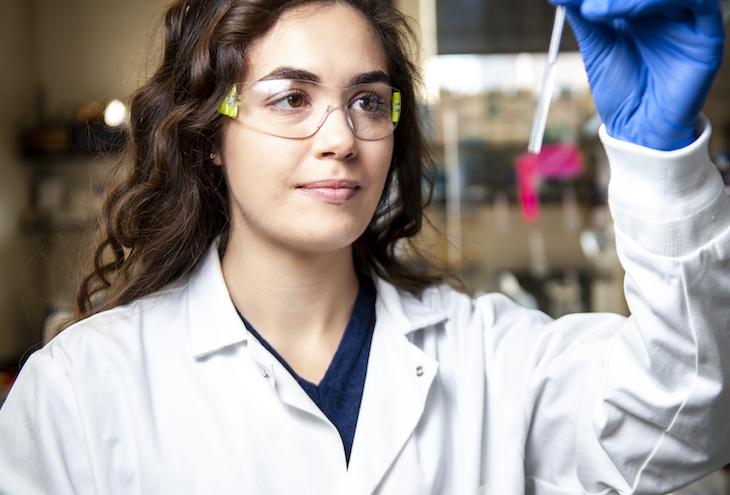AISES National Conference graduate research award winner, PhD candidate, and aspiring professor, Stephanann Costello is quickly becoming a global expert in a fatal disease. “I’m part of an interdisciplinary team studying a rare neurodegenerative disease called Familial dysautonomia. This disease is inherited, so these patients start exhibiting symptoms when they are infants. There is no known cure, and most therapies only target symptoms,” Costello explains.
Costello is Aleut, a people whose ancestral lands are the Aleutian Islands of modern Alaska and Russia. The tribe’s ancient lifeways reflect their coastal home — unlike the more familiar feather headdresses, the traditional Aleut headdress is composed of seashells and beads.
Born in Washington state, Costello moved with her family to Oregon before finally settling down in Butte, Mont. In high school, one of Costello’s teachers recognized her talent and urged her to take advanced placement chemistry — a life-changing decision. “I fell in love with my chemistry class,” says Costello. “My teacher was great at showing us real-world applications of the foundational knowledge of chemistry we were learning by giving us examples of research and development within chemistry and related fields. I thought it was truly amazing that research could be a career option.”
Costello went on to complete a bachelor’s degree in chemistry with a minor in biology at Montana Technological University. The undergraduate research opportunities at Montana Tech, and encouragement from her undergraduate advisor, and the prospect of working with her current mentor, Dr. Valérie Copié, inspired her to pursue graduate studies at Montana State University. Costello will soon be earning a PhD in biochemistry supported by the MSU Sloan Indigenous Graduate Partnership program and the Montana INBRE (IDeA Network of Biomedical Research Excellence) Native American Graduate Fellowship. “I worked on several research projects centered around human health that utilized unique resources to combat health disparities, not only in my community but also on a larger scale regarding antibiotic-resistant pathogens,” she says. “I fell into the health-related research fields very quickly and I love them. I never want to leave them.”
Costello’s current research focuses on the degraded interaction between the host’s metabolism and the gut-microbiome and nervous system in Familial dysautonomia patients. “The nerves that communicate between the gut and the brain are damaged due to the developmental and progressive nature of FD, which disrupts communication between these systems,” Costello explains. “The central metabolism is a huge communicator between the gut and the brain, and when one system is disrupted, they all negatively feed back into the other.” She says that her focus is understanding and studying the metabolism of these patients. “I want to see how we can target the metabolism to try and prevent further symptom development and disease progression,” she adds.
Like many students engaged in research, Costello has experienced impostor syndrome, which can be one of the most significant challenges of graduate school. It appears as the psychological distress students feel when they doubt their own skills and accomplishments to the point that they fear being exposed as an impostor. This feeling can be even more pronounced in students who are struggling with their Native identity and how well that identity fits — or doesn’t fit — in an academic setting.
Costello, a soon-to-be Native PhD, offers some valuable advice: “Part of my struggle with impostor syndrome is that because I’m Aleut, and I do share that, I have been concerned that my success is only a result of me representing a minority.” Coming to AISES, hearing the same story from other minorities, and the support and affirmation from Dr. Copié have been powerful in helping her overcome the doubt that she should not be claiming her Native identity. The realization that she would still be producing the work she is, whether she talks about being Native or not, has helped her recognize that, while she may not know everything, she does know a fair amount. Specializing in a field at her level makes her an expert. “I have the support of all of these people who believe in me even when I don’t,” she says. “And that says something for itself.”
An AISES member for five years, Costello has presented at every in-person AISES National Conference since 2018. Her most recent oral presentation was awarded first place in the graduate research category. The support from family, academic advisors and mentors, and AISES will help Costello on her journey to becoming a leading Native American professor. “The overall feeling I get from AISES is that everyone there really cares about your success even though they don’t know who you are,” she says. “Everyone is so supportive — it feels like a giant family when we get together. Every time I come back from AISES, I’m just raving about it for a month!”













